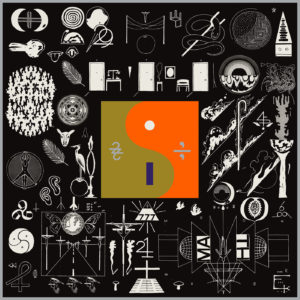 If you can get past the ridiculous song titles – honestly, “8 (circle)”? “Circle” in parentheses as if it’s supposed to imply that they would have put an actual circle there but couldn’t render it to their satisfaction, so we’re just supposed to imagine that, in a perfect world, there would be a circle there? – if you can get past the ridiculous song titles, Bon Iver’s third album, 22, A Million, is a harder, more experimental album than their previous work. While the artist’s signature acoustics and crooning style remains prevalent, many of 22, A Million’s tracks feature a use of electronic sound and voice distortion that brings the Wisconsin band out of the 1800s and into the digital age.
If you can get past the ridiculous song titles – honestly, “8 (circle)”? “Circle” in parentheses as if it’s supposed to imply that they would have put an actual circle there but couldn’t render it to their satisfaction, so we’re just supposed to imagine that, in a perfect world, there would be a circle there? – if you can get past the ridiculous song titles, Bon Iver’s third album, 22, A Million, is a harder, more experimental album than their previous work. While the artist’s signature acoustics and crooning style remains prevalent, many of 22, A Million’s tracks feature a use of electronic sound and voice distortion that brings the Wisconsin band out of the 1800s and into the digital age.
Voice distortion is a growing trend in the music industry, but some of its most effective uses are found in hip-hop. Kanye West has been doing it for years; more recently Frank Ocean’s “Nikes” featured almost exclusively distorted vocals throughout the entirety of the track. What makes voice distortion effective for these artists is that it serves a purpose aside from just creating a more interesting sound- these artists use the somewhat comical tone of the vocals to lend a stark contrast to the heavy content of the lyrics (police brutality, social injustice, poverty, self-esteem, and more). While Bon Iver’s implementation of voice distortion sounds nice, it feels unnecessary when his message- as in the arguably high point of the album “33, God”- is that he hopes you can stay for tea. Granted, the Wisconsin-based indie folk band is not trying to be anything they are not. 22, A Million explores new territory but doesn’t abandon the musical components that constitute the signature Bon Iver sound.
22, A Million features tracks that are distinctively more structured than typical Bon Iver song-writing. The aforementioned “33, God” for example features a pleasantly surprising drop after the initial unintrusive piano intro. Inevitably, however, most tracks eventually descend into the deconstructed series of sporadic instrumentals that were featured heavily in Bon Iver’s 2007 album, For Emma, Forever Ago. These deconstructed instrumentals are not unlike the deconstructed dishes that chefs often prepare on competitive cooking shows: you’re impressed by their creativity but at the end of the day if they had just put all the components together in the standard way it would have been easier to enjoy. Overall, however, 22, A Million is an album that Bon Iver fans will appreciate and music lovers in general will find to be a surprising, technically sophisticated contribution to the ever-evolving indie music scene.




